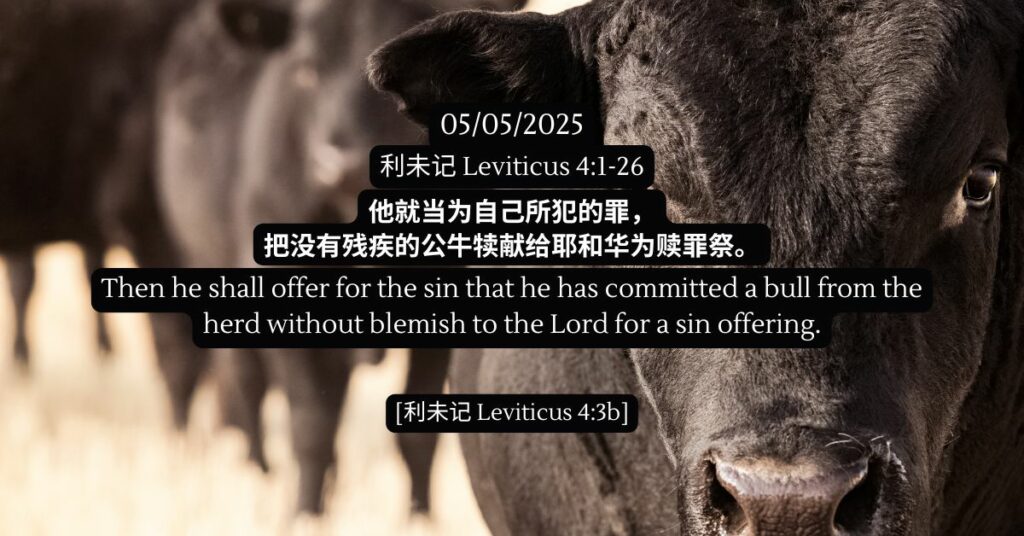Leviticus 4:1-26
And all its fat he shall remove, as the fat is removed from the peace offerings, and the priest shall burn it on the altar for a pleasing aroma to the Lord. And the priest shall make atonement for him, and he shall be forgiven. – Leviticus 4:3b
https://www.biblegateway.com/passage/?search=Lev+4%3A1-26&version=ESV
Today’s passage records the fourth type of offering in Leviticus, the sin offering. This offering is specifically for sins committed “בִּשְׁגָגָה”(bishgagah) that is, by mistake, negligence, or ignorance. This shows that sin is not only deliberate rebellion, but also includes unintentional wrongs. We may hurt others through our words, thoughts, or actions without realizing it, or we may forget to revere God in the busyness of life. The sin offering calls us to cultivate spiritual sensitivity and to regularly examine our words, actions, and thoughts.
The sin offering is dependent on the status of the person:
• The high priest offers a young bull,
• A leader offers a male goat,
• An ordinary person offers a female goat or lamb.
This reflects God’s holy justice. The higher one’s position, the greater one’s responsibility. It’s an important reminder to leaders today – greater influence means greater accountability, and mistakes can have wider consequences.
Next, the blood of the sin offering was sprinkled on the veil and the horns of the incense altar (vv. 5–7), symbolizing the giving and cleansing of life. This pointed forward to the redeeming power of Christ’s precious blood. Though we no longer offer animal sacrifices today, every time we confess and repent, we rely on Christ’s blood to cleanse us.
In addition, the fat of the sacrifice was to be completely burned on the altar (vv. 8–10). In ancient times, fat was considered the most precious part, symbolizing the best of life. By requiring the fat, God shows that true atonement is not just about removing sin, but also about offering the best of our lives to Him. Repentance, then, is not only turning away from sin, but it’s turning toward God and letting Him be the centre of our lives.
Finally, the remaining parts of the sacrifice were taken outside the camp to be burned (vv. 11–12). This foreshadowed Christ suffering outside Jerusalem (Hebrews 13:11–13), and it symbolized that sin must be completely removed. Let us reflect: Are we treating sin with such seriousness? Or do we still keep hidden corners in our hearts where sin lingers?
Today’s passage shows us that our holy God provides a way back for His sinful people. The heart of the sin offering is not punishment, but grace. God, knowing our weaknesses, has provided a path of redemption. Although we no longer need to offer sin sacrifices, the principles remain:
* Acknowledge our sins — whether unintentional or wilful, bring them before God.
* Trust in Christ’s blood — His redemption is complete and covers all sin.
* Offer our best to God — true repentance is not just stopping sin, but fully turning to God.
* Cut off sin completely — don’t allow it to linger and affect your relationship with God.
Prayer:
Loving Father,
Thank You for preparing complete redemption for us in Christ. Shine Your light on me and reveal the hidden sins in my life, whether due to negligence, ignorance, or ingrained habits. Please forgive me. Lord Jesus, thank You for giving Your life for me so that I am no longer bound by sin. Help me to completely turn away from all that displeases You, and offer my life wholly to You. Let me live for You alone.
In Your name I pray, Amen.

